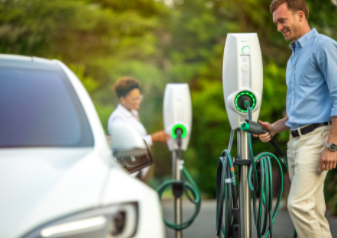Electric vehicles do not have a zero carbon footprint. That's right. But theirCO2 emissions are still much lower than those of combustion-powered cars...
As the figures show, the electric car is on a roll. According to a study published by Statbel in September 2020, 23,983 100% electric vehicles are currently registered in Belgium. Growth is strong: +56.4% per year, even if this still represents "only" 0.4% of the Belgian car fleet. Hybrid cars are also a hit, with almost 155,000 of them on the road - 5x more than 5 years ago - and are right on the heels of diesel and petrol cars on the sales podium.
However, the popularity of 100% electric cars is a matter of debate. Believers and detractors debate, sometimes vehemently, about its real environmental impact. What's really going on?
Does an electric vehicle emitCO2?
According to a study by the NGO Transport & Environnement, regardless of the European country in which it is manufactured and used, an electric car emits 3 times lessCO2 than a diesel or petrol car of equivalent size! What if the car is made in China? The figures remain in favor of electric vehicles, whose emissions are 22% lower than those of a diesel car, and 28% lower than those of a gasoline vehicle.
Another study, this time conducted at the VUB, confirms this. In Belgium, an electric car emits 3 to 4 times lessCO2 per kilometer than a conventional car. And if, in addition, the vehicle's recharging is carried out using only green electricity (solar panels, green energy contract),CO2 emissions would be 15 times lower!
However, a calculation by Professor Damien Ernst of ULiège estimates that an electric car would have to travel around 35,000 km before it began to emit lessCO2 than its internal combustion cousin.
Conclusion? Yes, the electric car has a carbon footprint, but its lifetimeCO2 cost remains very favorable.
What factors affect the carbon footprint of an electric car?
Battery manufacturing
The production of lithium-ion batteries accounts for 40% of the environmental footprint of electric cars. Several ores are needed to manufacture them: cobalt, lithium, copper, nickel... all of which are mined on the other side of the world in an environmentally unfriendly way.
However, thanks to the introduction of battery recycling channels (in Belgium, Bebat collects batteries), new eco-design techniques, the development of new chemistries and the reuse of batteries in a second life (for solar energy storage, for example), the reduction in the impact of the manufacturing stage is constantly improving.
The use of electric vehicles
In reality, an electric car in operation emits no exhaust pollutants, since there is no combustion. Nevertheless, fine particles are emitted by the abrasion of tires, roads and brakes.
The origin of the electricity used
To operate, an electric vehicle needs electricity. However, on a global scale, most of this power is still generated by gas or coal. In Europe, on the other hand, other, greener energy sources are being used. These include nuclear power plants and renewable energies (solar, wind, hydro). This will reduce theCO2 cost of electric cars.
In Belgium, you can even recharge your electric vehicle using only green electricity. This is particularly the case if you have photovoltaic panels, whose output can be used to power your charging station. Some energy suppliers also offer green energy contracts, which they guarantee are produced exclusively locally by their renewable facilities.
The advantages of electric cars
Even if its price may still be an obstacle, the electric car has many positive points:
- she's silent;
- it induces less aggressive driving behaviour;
- full tank" costs 2x less;
- low maintenance ;
- longer service life;
- reduced registration and road taxes;
- companies can deduct it up to 100% for tax purposes.
In short, while not totally carbon neutral, the electric car remains one of the solutions for moving towards more sustainable mobility and reducing the environmental impact of traffic.
Need a recharging solution for your (future) electric vehicle? Discover our smart, fast and turnkey charging stations.
Interested? Contact us !

